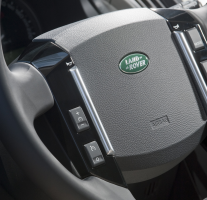
— A Land Rover LR2 battery drain class action lawsuit may finally be over as an appeals court determined a lower court decision to dismiss the lawsuit was proper.
The Land Rover LR2 lawsuit alleges the vehicles have defects that cause the batteries to drain, something owners allegedly began complaining about in 2009.
Land Rover issued a special service message to dealerships in January 2010 to let dealers know the battery drain issue was under investigation.
Engineers discovered if a driver turned off the ignition on an LR2 while using Bluetooth for a phone call, and while running the navigation system, the infotainment system would remain on and could drain the battery overnight.
In 2011, Land Rover issued a bulletin announcing an update to the infotainment system software that would fix the battery drain issue if owners complained of a drained battery.
Plaintiff Victorya Manakin purchased a used Land Rover LR2 in 2012, but the vehicle was making an abnormal sound and was having problems starting. In 2013, she went to a dealer and complained about an abnormal sound, but by then the warranty had expired.
The battery allegedly kept having problems and the plaintiff claims the battery was drained several times.
Manakin filed the battery drain lawsuit and argued the abnormal sound in December 2012 while the car was still under warranty was caused by the drained battery. Manakin also argued the warranty’s time limits were "unconscionable."
However, the district court ruled in favor of Land Rover and dismissed the case.
U.S. Court of Appeals for the Third Circuit
The plaintiff appealed by arguing the Land Rover LR2 was unconscionable and the lower court made a mistake by tossing the class action lawsuit.
Manakin argues the LR2 warranty was unconscionable because Land Rover knew the batteries would drain but did not inform customers.
The appeals court explains an express warranty does not cover repairs made after the applicable time has ended, so “latent defects discovered after the term of the warranty are not actionable.”
The lower district court explained, “at most, Plaintiffs present the Court with a scenario in which a manufacturer knew of a potential defect, one that may or may not manifest for customers, but which did not manifest during the warranty period.”
The district court judge was unpersuaded that, “Jaguar’s conduct—not informing Plaintiffs of a potential defect that did not manifest in their vehicles during the warranty period—was sufficiently oppressive or inconsistent with public policy as to make the durational limits unenforceable as unconscionable.”
The appeals court agreed and found Manakin did not show that Land Rover’s behavior was unconscionable.
"Whatever general knowledge Jaguar possessed at the formation of the warranty does not render the time-limitation unconscionable without further evidence of unequal bargaining positions, compulsion, or other countervailing public interests." — U.S. Court of Appeals for the Third Circuit
According to the appeals court, the evidence fails to link the drained battery problem to the problem the plaintiff says she experienced in 2012.
The dealership service invoice for the visit said, “customer states vehicle hesitates to start intermittently, happened after vehicle was running for about 15 min[utes].”
During a deposition, Manakin testified that when she would start the car, “there was a hesitation in the engine starting,” and there was a “long crank.”
She said this happened after running the vehicle for roughly 15 minutes and then shutting it off. She also clarified the problem did not prevent her from starting her Land Rover LR2, but the vehicle “was just not sounding normal.”
The Land Rover dealership also tested the LR2 battery and found no problems.
"Even construing these facts in the light most favorable to Manakin, no reasonable juror could draw the inference that the issue Manakin experienced in 2012 was the same as or caused by the flat-battery defect." — U.S. Court of Appeals for the Third Circuit
The Land Rover LR2 battery drain class action lawsuit was filed in the U.S. District Court for the District of New Jersey: Block, et al., v. Jaguar Land Rover North America, LLC.
The plaintiff is represented by Nagel Rice, LLP.




